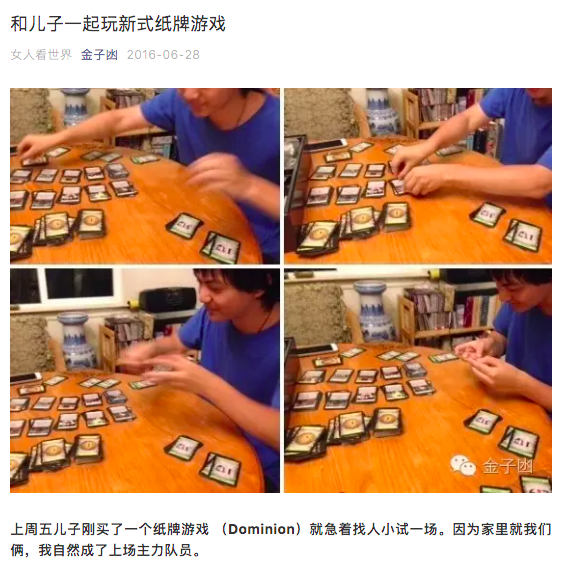06-28-2016
Last Friday, my son bought a new board game, Dominion, and he really wanted someone to play with him, so I played with him.
The beginning of the game is simple: every player has the same things to start with: 7 copper coins and 3 victory points (each victory point costs 2 copper coins normally).
There are ten randomized cards you can buy from in the start game, as well as gold coins, silver coins or copper coins. Players can also can buy victory cards worth of 6, 3, or 1 victory point each.
I used to play poker “ZhengShangyou” in my school years, my experience from this game was that cards with stronger attacking power will increase the chance to win. So in the first game, under my budget, I always buy strong attacking cards, like ‘Militia’ which will earn 2 copper coins and will force the rest of the players to discard 2 cards in their hands, when it is placed out. My mind was set to attack, and I lost the first game: I got 13 points, far below my son’s 40 points.
Before we start the second game, I understood a bit about the game after chatting with my son. He explained: “Dominion is a strategy game, not a simple attacking game. Without a strategy, you will likely lose.”
During the second game, I started to think about strategy before I made purchases, although I did not have a clear mindset on what strategy I should use. After I made a few purchases without knowing why, I realized that I should had watched how my son bought things during the game, but it was too late, and I lost the second game.
At the beginning of third game, I watched my son’s buying patterns very closely and mimicked his buying order quickly, though I don’t know why, I won the third game.
On the fourth game, my son totally changed his strategy, before I figured out his buying patterns, he had already won the fourth game.
Playing the game is not a simple and easy task, it requires a lot of practice to know what to buy, this was why my son won so quickly.
My Thoughts after the Game
1. Generation Gap
Today’s board game seemed to encourage planning strategies on top of fair competition, unlike “ZhengShangYou”, which was more focused on using strong cards to beat up the other players to win.
The board games of today will train different thinking skills from the ones of my youth did. This difference probably will be one of the factors enlarging generation gap between me born in the ’60s and my son born in the ’90s.
2. Copy Cat
I was motivated to play, as books said, parents who could win the game their children like to play may earn surprise respects from their children.
I did well as a copy cat. Copying enables a player to utilize others’ well mastered knowledge in a quick productive fashion. I suddenly understood why IT companies spend lots of resources to protect themselves from being copied by competitors. Otherwise, IT companies could be defeated by copy cat more easily.

